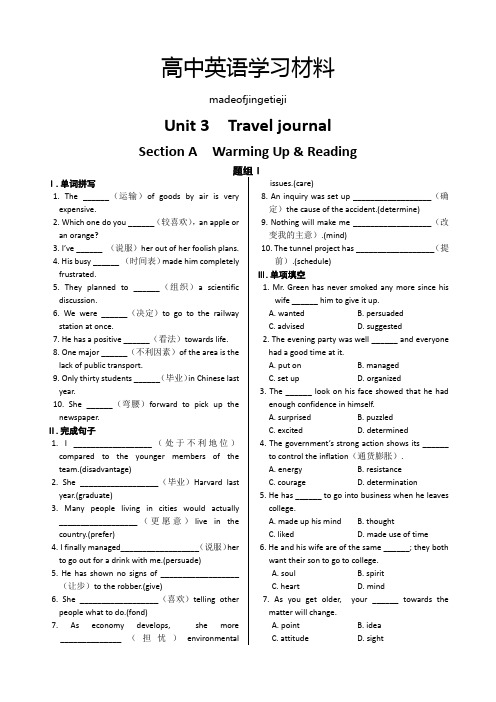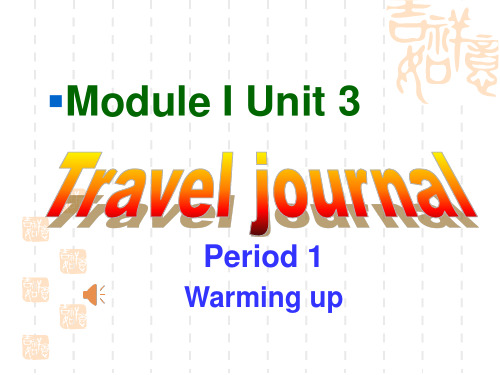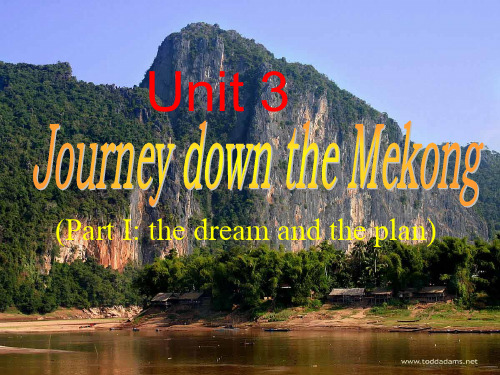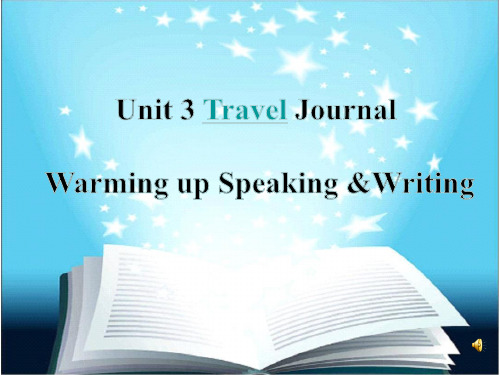人教版高一英语必修一第三单元Traveljournal热身课warmingup备课讲稿
- 格式:ppt
- 大小:8.19 MB
- 文档页数:28

高中英语学习材料madeofjingetiejiUnit 3 Travel journal Section A Warming Up & Reading题组ⅠⅠ.单词拼写1. The ______(运输)of goods by air is veryexpensive.2. Which one do you ______(较喜欢),an apple oran orange?3. I’ve ______ (说服)her out of her foolish plans.4. His busy ______ (时间表)made him completelyfrustrated.5. They planned to ______(组织)a scientificdiscussion.6. We were ______(决定)to go to the railwaystation at once.7. He has a positive ______(看法)towards life.8. One major ______(不利因素)of the area is thelack of public transport.9. Only thirty students ______(毕业)in Chinese lastyear.10. She ______(弯腰)forward to pick up thenewspaper.Ⅱ.完成句子1. I __________________(处于不利地位)compared to the younger members of the team.(disadvantage)2. She __________________(毕业)Harvard lastyear.(graduate)3. Many people living in cities would actually__________________(更愿意)live in the country.(prefer)4. I finally managed__________________(说服)herto go out for a drink with me.(persuade)5. He has shown no signs of __________________(让步)to the robber.(give)6. She __________________(喜欢)telling otherpeople what to do.(fond)7. As economy develops, she more______________(担忧)environmentalissues.(care)8. An inquiry was set up __________________(确定)the cause of the accident.(determine)9. Nothing will make me __________________(改变我的主意).(mind)10. The tunnel project has __________________(提前).(schedule)Ⅲ.单项填空1. Mr. Green has never smoked any more since hiswife ______ him to give it up.A. wantedB. persuadedC. advisedD. suggested2. The evening party was well ______ and everyonehad a good time at it.A. put onB. managedC. set upD. organized3. The ______ look on his face showed that he hadenough confidence in himself.A. surprisedB. puzzledC. excitedD. determined4. The government’s strong action shows its ______to control the inflation(通货膨胀).A. energyB. resistanceC. courageD. determination5. He has ______ to go into business when he leavescollege.A. made up his mindB. thoughtC. likedD. made use of time6. He and his wife are of the same ______; they bothwant their son to go to college.A. soulB. spiritC. heartD. mind7. As you get older, your ______ towards thematter will change.A. pointB. ideaC. attitudeD. sight8. It was from only a few supplies(用品)that shehad bought in the village ______ the hostess cooked such a nice dinner.A. whereB. thatC. whenD. which9. At last, I was able to ______ my mother tofollow my advice.A. suggestB. adviseC. persuadeD. prefer10. How pleasant the picture is to______!A. be looked atB. for looking atC. looking atD. look at11. That hero who died in the war was so brave thathe never ______ to the enemies until death.A. gave upB. gave outC. gave inD. gave away12. He prefers ______ indoors ______ out this afternoon.A. to stay; to goB. staying; to goingC. staying; to goD. to stay; to going13. He was determined that his children ______ tothe best school available(可利用的).A. should goB. wentC. ought to goD. would go14. It was about 5 o’clock in the afternoon ______they had their supper.A. thatB. whatC. beforeD. when15. Tom’s ______ towards guests really makes me feelembarrassed in the party.A. advantageB. abilityC. activityD. attitude16. —Aidan, you have been said that you wouldn’thelp your friends.—I don’t ______ what people think.A. care forB. care aboutC. care ofD. care at17. The man insisted ______ a taxi for me eventhough I told him I lived nearby.A. findB. to findC. on findingD. in finding18. My classmates insisted that I ______ the schoolfield trip to Jilin.A. organizedB. would organizeC. organizeD. had organized19. These days they have been ______ the medicinefrom Nanjing to Chengdu.A. translatingB. makingC. changingD. transporting20. He is so ______ that no one can persuade him tochange his mind.A. simpleB. hard-workingC. fortunateD. stubborn21. Have you ______ whether to take part in thesports meeting to be held next week?A. made up your mindB. made into your mindC. made into your mindsD. made your minds22. Taxi ______ was raised again because the price ofoil was higher than before.A. feeB. fareC. chargeD. pay23. Four policemen rode past on their motorbikes,then came the television broadcasting car, and ______ the marathon(马拉松)runners.A. finallyB. in the endC. at lastD. latelyⅣ.阅读理解AAmericans like to travel on their yearly holiday. Today, more and more travelers in the United States are spending nights at small houses or inns(客栈)instead of hotels. They get a room for the night and the breakfast the next morning.Rooms for the night in private(私人的)homes with breakfast have been popular with travelers in Europe for many years. In the past five to ten years, these bed-and-breakfast places have become popular in the United States. Many of these America’s bed-and-breakfast inns are old historic buildings. Some bed-and-breakfast inns have only a few rooms; others are much larger. Some inns do not provide telephones or televisions in the rooms; others do.Staying at a bed-and-breakfast inn is much different from staying at a hotel. Usually the cost is much less. Staying at an inn is almost like visiting someone’s home. The owners are glad to tell about the areas and the interesting places to visit. Many vacationers say they enjoy the chance to meet local families.1. Americans take a holiday trip______.A. all the year roundB. for yearsC. every yearD. every other year2. According to the passage, which of the followingis NOT true?A. Some Americans like to stay at bed-and-breakfast homes instead of hotels.B. The bed-and-breakfast inns are private homesopened to vacationers.C. The bed-and-breakfast inns have been popular inAmerica for a very long time.D. The bed-and-breakfast inn owners provide amorning meal for their visitors and a room for the night.3. Why do American travelers prefer staying at bed-and-breakfast inns?A. It is like visiting someone’s home.B. The money they spend there is much less.C. They can meet local families.D. All of the above.4. Staying at the bed-and-breakfast inns, ______.A. the travelers needn’t pay anythingB. the travelers don’t have to pay for the telephoneor televisionC. the travelers can meet and talk with the localpeopleD. the owners will show the travelers around the area5. Which of the following is TRUE according to thepassage?A. European and American vacationers like stayingat bed-and-breakfast inns.B. All Americans enjoy traveling.C. These bed-and-breakfast inns are all old historicbuildings.D. Staying at a bed-and-breakfast inn is just like atthe traveler’s home.BShanghai—A musician who lost both arms in a childhood accident and plays the piano with his toes has won“China’s Got Talent(中国达人秀)”, playing his version of James Blunt’s wistful(忧郁的)love song “You’re Beautiful”to a packed audience at the Shanghai Stadium.All three judges on the show Sunday praised 23-year-old Liu Wei for his determination, encouraging him to keep on trying to realize his dreams, and the Beijing native said he would try.“At least I have a pair of perfect legs.”he said.For winning the Chinese version of“British’s Got Talent”, Liu will be invited to play as a guest performer(表演者)with Taiwanese singer Jolin Tsai. He also has the chance for a performing contract(合同).Liu’s arms were amputated(截肢)after he suffered an electrical shock while playing hide-and-seek when he was 10. At age 18, he decided to have a career in music, using his feet to play the piano, much as he uses them to navigate (导航)on the computer, eat, dress and brush his teeth.One year later, he was given the chance to work with the famous Hong Kong pop star Andy Lau and they composed(创作,作曲)the song Let It Be.The jury panel(评审)of China’s Got Talent, Shanghai stand-up(单人表演的)comedian Zhou Libo, Taiwan singer-actress Annie Yi and mainland pop composer Gao Xiaosong, all thought highly of Liu’s performance.While interviewed, Liu Wei said, “For me, there are only 2 paths in my life—either to die as fast as possible, or to live as brilliant a life as I could.”Whenever he is faced with difficulties, he always says to himself“Walk on, at least I have a pair of perfect legs.”China’s Got Talent, a weekly program shown on local channel Dragon TV, has helped draw attention to the hopes and challenges of the disabled and otherwise disadvantaged Chinese.The program, which began in July, is part of British recording executive Simon Cowell’s“Got Talent”franchise(经销权),which now has versions broadcasting in more than 30 countries.6. What happened to Liu Wei when he was 10?A. He won“China’s Got Talent”.B. He suffered an electrical shock and his armswere amputated.C. He began to play the piano with his feet.D. He composed the song Let It Be with Andy Lau.7. When did Liu Wei begin to pursue(追求)a careerin music?A. When he was 10.B. When he was 18.C. After he won“China’s Got Talent”.D. After he worked with Taiwanese singer JolinTsai.8. Which of the following is TRUE?A. Liu Wei comes from Beijing.B. Annie Yi is a mainland singer-actress.C. China’s Got Talent is a version of American“GotTalent”.D. China’s Got Talent is a daily program whichbegan in July.9. What’s the best title of t he passage?A. China’s Got Talent—Liu WeiB. Liu Wei’s childhoodC. Liu Wei highly thought of for his determinationD. A weekly program—China’s Got Talent答案与解析Ⅰ. 1. transport 2. prefer 3. persuaded4. schedule5. organize6. determined7. attitude 8. disadvantage 9. graduated10. bentⅡ. 1. was at a disadvantage2. graduated from3. prefer to4. to persuade5. giving in6. is fond of7. cares about 8. to determine9. change my mind10. been ahead of scheduleⅢ. 1. B 考查动词词义。





Topic: Warming upLesson duration: 40 minutesTeaching Contents: Warming up of Unit 3Teaching key points and difficult points:Students can talk about his/her traveling experience with his/her partner.Teaching objectives:1. Knowledge objectives:Students can get some information about travel and the Mekong River.2. Ability objectives:Students can talk about his/her traveling experience with his/her partner.3. Emotion objectives:Stimulate students’ love for nature by getting them to know the greatness of a river. Teaching methods:Task-based teaching and learning; Cooperative learning and reading; Discussion Teaching Procedures:Step 1 Lead-inTeacher: “Good morning, boys and girls. Last week we had finished National Day holiday, right? So have you travelled around on holiday?”Students: “Yes.”Teacher: “So it means that you like travelling, right?”Students: “Yes.” “No.”Step 2 Preparation for travelTeacher: “Well, I hear someone say ‘yes’, and others say ‘no’. So if you say ‘yes’, why? If you say ‘no’, why?”Student A: “I do not like travelling, because travelling is tired.”Student B: “I like travelling because I think travelling is interesting.”Teacher: “OK. And I believe that even if you do not like travelling, you should have the experience to travel. So what should we consider before travelling? Maybe you can have a discussion with your partner now.”Students: “Clothes.” “What to take.” …Teacher: “Well-done. So we should consider the following things. At first, let’s talk about transportation. In other words, we need to think about how we get thedestination, right? So what kind of transportation would you choose? And why?”Student A: “I want to take the bus, because it is cheap.”Student B: “ I want to take the airplane, because it takes a short time.”…Teacher: “Good. These transportation can help us reach our destinations. In order to have a perfect journey, what else do we need to consider besides transportations?”Students: “Maybe we should take something.”Teacher: “Very good. As we all know, we choose too much things to take, which may make our journey not comfortable. So I will you nine things, and you can pick three of them. And tell me your reasons why you choose them. Ok? And now you can have discussion with your partner.”Students: “…”Teacher: “I agree with your opinions. They are very important. So if you have a chance to travel in the following days, where will you go?’’Student A: “Chengdu.”Student B: “Shanghai.”Teacher: “Can you tell me reasons?”Students: “…”Teacher: “Good reasons. But if I were you, I will choose to travel along the river? As we all know, there are many famous rivers in our country. Do you know them?”Step 3 Some information about Chinese RiverTeacher: “Let’s look at the picture at first. Can you guess what is it? Well, I will give you some tips. This river is called our mother river.”Students: “The Yellow River.’Teacher: “Good. And can you guess the river’s name from the picture? Well, I will give you some clues, too. It is the longest river in China.”Students: “The Changjiang River.”Teacher: “And the next river, maybe you do not know it. But do not worry. I will tell youits name directly. Its name is the Mekong River. And the river begins in Qinghai Province and flows through several countries. And look at the following picture to talk the countries it flows.”Step 4 SummaryTeacher: “So today we have learned two parts: the preparation before travel and some information about the Mekong River. Are you clear now?”Students: “Yes.”Step 5 HomeworkTeacher: “Very good. And today’s homework is to inish pre-reading part on page 54. Class is over。